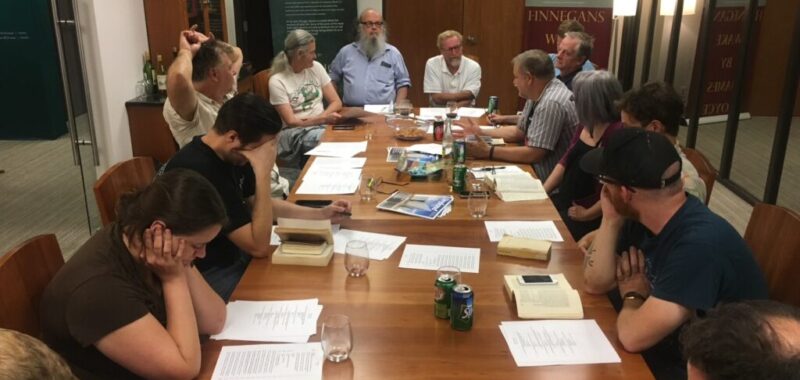In 1939, Irish author James Joyce published “Finnegans Wake,” a piece of literature that defies comprehension.
“riverrun, past Eve and Adam’s,” it begins, “from swerve of shore to bend of bay, brings us by a commodius vicus of recirculation back to Howth Castle and Environs.”
The book starts and ends with a sentence fragment, combines multiple languages and has no clear or linear plot.
It’s a work that’s so dense, one group that started in Austin has been working on it for more than a decade.
“We’re only reading one page at a time,” said Peter Quadrino, founder and organizer of the Finnegans Wake Reading Group of Austin, TX.
Every other week, Quadrino hosts a Zoom call where people from around the world gather and attempt to understand one of the most infamous books in English literature.
The group spends the first 15 minutes of each meeting socializing. Then they all go around in a circle and each person reads two lines until they’re done with that week’s page.
After that, they spend about an hour and a half researching, annotating and trying to make sense of Joyce’s experimental prose.
“We used to read two pages per meeting,” said Quadrino. “Then at a certain point there was just so much going on in the pages and so much in the discussion that we had to lower it to one page per meeting.”
“Finnegans Wake” is confusing – and, to many, totally incomprehensible – but the book’s complexity has made it a point of fascination for literary enthusiasts in the eight decades since it was first published.
Houston, New York, Boston, Seattle, Dublin, Kyiv and many other cities around the world host groups dedicated to reading and analyzing “Finnegans Wake.”
“I’ve spoken at Joyce conferences in I think six different countries now,” said Quadrino, “and just being in this world, I’ve made so many friends.”
The Finnegans Wake Reading Group of Austin, TX is moving through its book at a glacial place – and that’s the point. Their focus is the journey, not the destination.
“I never really consider what it’s going to be like when we finish because I don’t want it to end,” explained Quadrino, “and if we do finish we’ll just circle right back to the beginning and keep reading.”
If you found the reporting above valuable, please consider making a donation to support it here. Your gift helps pay for everything you find on texasstandard.org and KUT.org. Thanks for donating today.

